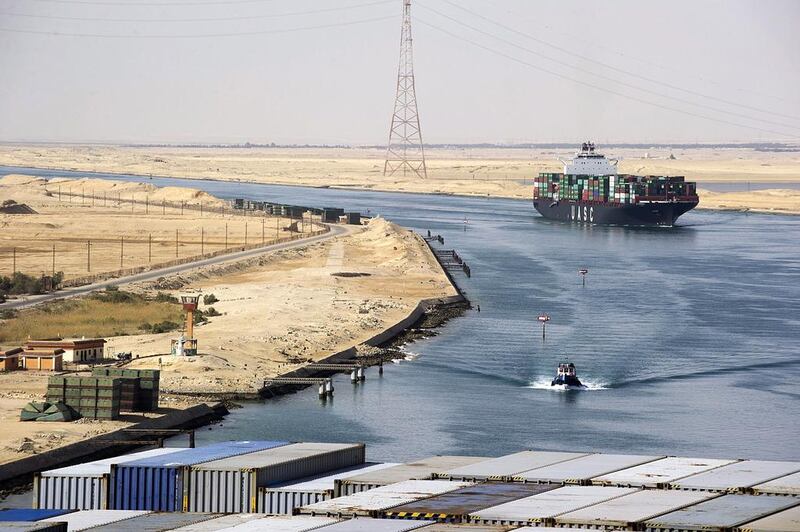Cairo // Mega projects including the new Suez Canal Corridor are expected to take centre stage at a conference in Egypt that hopes to draw international investors and showcase the government of Abdel Fattah El Sisi’s new economic vision.
The economic summit, “Egypt the Future,” is scheduled to take place from March 13 to 15 in the Red Sea resort town of Sharm El Sheikh.
The minister of investment Ashraf Salman has said more than 40 private-sector projects are being prepared ahead of the conference, 30 of which, worth an estimated total of US$10 billion to $15bn, will be offered to investors.
According to Alaa Ezz, the secretary general of the federation of Egyptian chambers of commerce Fedcoc and an ambassador for the conference, most of these investment opportunities fall within the energy sector or the master plans of Egypt’s current mega projects.
The Suez Canal Corridor sits prime among these mega projects, along with its accompanying components, namely four ports and logistics zones, two airports, four tunnels beneath the canal, four million acres of agricultural development, 77,000 acres of fish farms and 16,500 acres of industrial zones.
Additional projects include the new Damietta grain storage and manufacturing hub, a mega retail city in the Gulf of Suez, and numerous opportunities in the housing and tourism sectors in particular.
The economic summit was originally proposed by the late Saudi King Abdullah in a congratulatory speech following Mr El Sisi’s election in June. In his speech, King Abdullah extended an open invitation for a “Friends of Egypt” donor conference, calling on assistance for Egypt to “overcome its economic crisis”.
Subsequent collaboration for the summit commenced in August last year. Since then, a ministerial group chaired by the Egyptian prime minister Ibrahim Mehleb along with UAE and Saudi ministers has been meeting at least once a month to discuss the evolving goals and projects of the conference while their respective teams have been gathering daily.
According to Mr Ezz, the outcome of this collaboration in terms of joint investment projects between Egyptian and Arabian Gulf partners will be announced at the conference.
Securing additional Arab investment is a major aim of the summit. Gulf capital has played a significant role in keeping the Egyptian economy afloat in the aftermath of the 2011 January 25 Revolution, particularly following the removal of the former president Mohammed Morsi in July 2013. Since then, commitments from Saudi Arabia, the UAE and Kuwait have exceeded $20bn, consisting of a mix of cash grants, petroleum products, central bank deposits and project aid.
Non-aid investment from the Gulf is also considerable, with the UAE, Saudi Arabia and Kuwait taking the top three places, for the largest investments in Egypt according to Egypt’s state information services.
In advance of the conference, Gulf investors in particular have been pushing for quick dispute resolution and legal assurances that their billions in investments will be secure. Following the January 25 Revolution, a number of Gulf investors faced trial for disputes over privatisation and land sale deals signed with the deposed Mubarak government.
One such long-standing dispute was resolved in November for the Dubai-based Al Futtaim Group. As part of the settlement the conglomerate, which began work in 2008 on the major property development Cairo Festival City, agreed to pay $30.5 million to the government alongside a pledge to invest an additional $700m investment in future projects.
The current Egyptian government aims to settle outstanding cases before the summit in order to boost investor confidence. According to Mr Ezz, a ministerial committee chaired by the minister of justice has been formed to expedite investment dispute resolutions, with 259 out of 395 disputes resolved in the past three months. He adds that an additional committee chaired by the prime minister has been created for settlement of contract disputes, with 14 out of 25 resolved.
Mr Salman has stated that disputes are being settled on a case-by-case basis through this committee due to a lack of alternative institutional mechanisms.
Additional legislative reform to attract foreign investors is also in the works. According to Mr Ezz, the revision of key investment legislation and regulation is almost complete, and, “amendments are being conducted at a very fast pace to be concluded before the conference”.
Specifically, these amendments concern special economic zones, land allocation, electricity, customs, taxes and government procurement. Mr Salman has also noted that money market laws have been amended to facilitate a “safe exit for investors”.
A much discussed unified investment law, currently in draft form, also aims at attracting investors by simplifying the processes of acquiring licences by offering a “one-stop shop” investment window.
However, the law has been met with considerable resistance. Many activists argue it will encourage corruption by removing judicial oversight of government deals. Additional resistance comes from within the government itself, with some ministries opposing proposed customs and tax incentives expected to be offered to investors.
Mr Salman announced last month a draft of the law had been sent out for review by dozens of international organisations, including the World Bank’s International Finance Corporation, as well as to various domestic ministries and universities.
New legislation was also discussed between top Egyptian businessmen and state officials at a summit preparation conference held in Cairo last month.
Naguib Sawiris, a business tycoon and member of Egypt’s wealthiest family, says the country is taking a new approach to economic reforms. “Now a law can’t come out without sitting down with the investors and figuring out their opinion in the law, rather than making the law and imposing it on them.”
According to Mr Salman, the Cairo meeting last month with top Egyptian investors was a big step in “laying out a main plan for the future policies for Egypt for the coming four years and figuring out what has to be done before the economic summit”.
On the government side, the ministry of international cooperation has been tasked with mobilising state officials, donors and development banks. Mr El Sisi has also actively advertised the summit at various international venues, including the World Economic Forum in Davos last month.
Meanwhile, a comprehensive programme for conference promotion was launched in January by the state directed Fedcoc. Prime minister Mehleb has appointed Ahmed el Wakil, the president of the federation, and Mr Ezz, as ambassadors for the event.
Over the past three weeks, members of the promotional delegation have been sent to Moscow, Berlin, Brussels, Luxembourg, Barcelona, Paris and Beirut to explain the goals of the summit and present the legislative reforms intended to improve the business climate. The delegation has also presented business opportunities that will be offered at the conference, as well as Egypt’s new political and economic roadmaps.
According to Mr Ezz, leading companies of each country were present at the meetings and large delegations will be attending the summit. He adds that targeted invitations have been sent to specific chief executives worldwide.
A number of prominent international companies, particularly from the energy sector, have already confirmed their attendance including General Electric, BP, and Eni, the Italian oil explorer and driller. Major international financial organisations will also be attending, including the World Bank and IMF.
Despite the hype surrounding the summit, Abla Abdel-Latif, an adviser to the minister of industry and trade, says the event must be used as a springboard.
“It is very important to view the economic conference as a starting point in a larger process of putting Egypt back on the investment map and not an end in itself. There is still much work ahead.”
business@thenational.ae
Follow The National's Business section on Twitter





